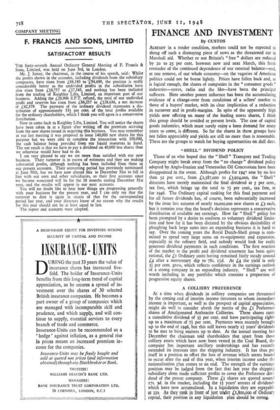FINANCE AND INVESTMENT
By CUSTOS
ALREADY in a tender condition, markets could not be expected to shrug off such a dismaying piece of news as the threatened cut in Marshall aid. Whether or not Britain's " free " dollars are reduced by zo to 25 per cent, between now and next March, this fresh reminder of the continued dependence of our external balance—and, at one remove, of our whole economy—on the vagaries of American politics could not be borne lightly. Prices have fallen back and, as is logical enough, the shares of companies in the " consumer goods " industries—stores, radio and the like—have been the principal sufferers. Here another potent influence has been the accumulating evidence of a change-over from conditions of a sellers' market to those of a buyers' market, with its clear implication of a reduction in turnover and in profit-margins. In spite of the apparently high yields now offering on many of the leading stores shares, I think this group should be avoided at present levels. The case of capital goods industries, which must surely enjoy a keen demand for many years to come, is different. So far the shares in these groups have not fallen appreciably and yields are still no more than is reasonable. These are the groups to watch for buying opportunities on dull days.
.4 SHELL " DIVIDEND POLICY Those of us who hoped that the " Shell" Transport and Trading Company might break away from the "no change" dividend policy adopted by Anglo-Iranian and Venezuelan Oil Concessions have been disappointed in the event. Although profits for 1947 rose by no less than 52 per cent., from £2,587,000 to £3,924,000, the " Shell" directors have merely maintained the final -dividend at 5 per cent., tax free, which brings up the total to 71- per cent., tax free, as for 1946. The Ordinary capital ranking for this final payment and for all future dividends has, of course, been substantially increased by the issue last autumn of nearly to,000,000 new shares at £3 each, but it remains true that the board's decision represents a conservative distribution of available net earnings. How far " Shell" policy has been prompted by a desire to conform to voluntary dividend limita- tion and how far it has been dictated by the obvious desirability of ploughing back large sums into an expanding business it is hard to say. Over the coming years the Royal Dutch-Shell group is com- mitted to spend very large sums on re-equipment and expansion, especially in the refinery field, and nobody would look for really generous dividend payments in such conditions. The first reaction of the market to the profit and dividend statement has been quite rational, the Li Ordinary units having remained fairly steady around £4 after a momentary dip to 78s. lid. At £4 the yield is only 3# per cent. gross, which reflects confidence in the earnings outlook of a strong company in an expanding industry. " Shell" are well worth including in any portfolio which contains a proportion of progressive equity shares.
A COLLIERY PREFERENCE At a time when dividends in colliery companies are threatened by the coming end of interim income investors to whom immediate income is important, as well as the prospect of capital appreciation, might do well to consider afresh the merits of the Li Preference shares of Amalgamated Anthracite Collieries. These shares carry a cumulative dividend of 3f per cent. and have participating rights up to a maximum of 71 per cent. Payments were recently brought up to the end of 1946, but this still leaves nearly 'I years' dividends to be met to bring matters up to date. At the annual meeting last December the chairman told shareholders that apart from those colliery assets which have now been' vested in the Coal Board, the company has important ancillary undertakings and has recently extended its interests into the shipping industry. It has thus put itself in a position to offset the loss of revenue which seems bound to occur after the end of this year, when interim income under the nationalisation plan comes to an end. The strength of the earnings position may be judged from the fact that last year the shipping subsidiary alone made sufficient profits to cover the Preference divi- dend of the parent company. These Li shares are quoted around 17s. 3d. in the market, including the if years' arrears of dividends which have now accumulated. In a liquidation they are repayable at 223. As they rank in front of just under £x,800,000 of Ordinary capital, their position in any liquidation plan should be strong.






























 Previous page
Previous page